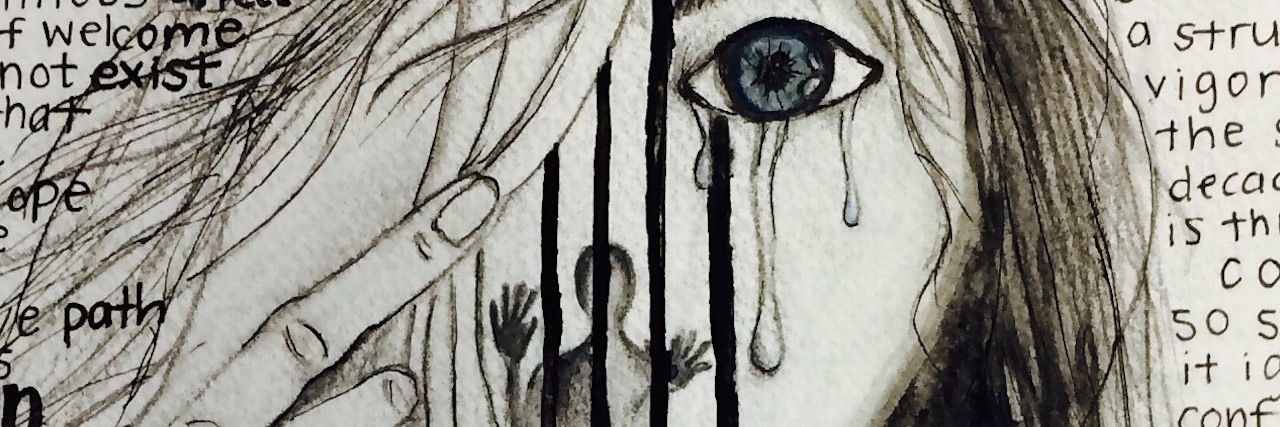It’s a week before finals during my first full-time college semester in 7 years. I feel the darkness creeping in, encroaching on the piece of my brain that had actually begun to feel less burdened since starting electroconvulsive therapy (ECT) the previous fall. I start to feel guilty about letting myself believe, once again, that I’m capable of lasting recovery.
The difficulty of living with recurring mental illness does not surface solely in times of its viscous presence. It is my belief that most people without personal experience cannot understand the two-sided nature of early recovery, where its presence can be as much of a tease as a relief.
Having lived with depression for the last fourteen years, I have found that as jaded as it may seem, a certain amount of anticipatory caution can be more protective than harmful. I agree that a status quo born from realism isn’t particularly encouraging, yet it is much less painful
than watching a carefully molded hopefulness shatter beneath the eager foot of crushing despair for the umpteenth time.
Now it’s Monday of finals week and I’m sitting on my bed in an inpatient psych unit berating myself for not sitting at my desk solving a statistics problem on the final exam; feeling foolish for allowing myself to cradle the fickle belief that I wouldn’t end up back here. In these moments, it’s hard not to let the unrelenting nature of this illness morph into suicidal ideation. Hence the hospital. I pull out my journal, knowing that poetry is the safest home for my deepest, visceral feelings. As I write, it feels as though the words flow directly from soul to pen. Soon, I have the draft of a poem clearly founded in inspired honesty. I hope it creates a bridge that inspires a journey toward genuine open-mindedness and empathic support for those repeatedly interrupted by returning darkness.
“You’ve Arrived” — my honest perspective on living with recurring mental illness:
You’ve arrived
uninvited —
slipping through the decrepit side door
of a consciousness
that has spent years
soothing itself
with the notion
of your extinction.
You’ve arrived
with vigorous haste —
I’d like to say I’m prepared,
anticipating such a costly intrusion,
but I have been too busy
preparing myself for the lesson
that a life anticipating your return
is no life at all.
You arrive
with such pretentious affect –
a presumption of welcome
you know
does not exist.
A presumption
that a brief interlude
of entertaining hope
would force time
to plant flowers
over your extensive path
of callous destruction.
We’ve been engaged
in a battle
whose vicious,
invisible nature
provides you
immeasurable advantage.
Whose complexity
rips my intellect
from the pages of a book,
only to engage it in discussion
that sears thoughts,
once encouraged and passionate,
on the stoked embers
of benign anxiety.
This flight of my fight
has not been
solely to banish you
from a mind
yearning for release.
It’s a slow, strenuous reemergence
defined by letting go
of a past defined
by the constant reminders
of your virulent havoc.
I have been trying
to overcome
the fear of your return
without first overcoming
the embedded belief
that you are
never really gone.
A belief utterly indulged
when you barge through
my skull cage
without
warning.
Your abrupt entrance
is in vivid contrast
to the lengthy, explicit effort
I have put forth —
to banish
your suffocating darkness.
to repair a
self-perspective burdened by hate,
to believe
hope is not a master of deceit,
to know
starvation is neither solution nor friend,
to find compassion
for shame based sensitivity,
to say,
confidently from my soul
that I want to live.
I watch in astonishment
as the structure I have built
out of fresh pursuit,
a structure vigorously affirming
the strength
of decade long progress,
is threatened with collapse
so swiftly and violently
it feeds the confidence
of a doubt
newly subdued.
I do not wish to watch
as you reaffirm my hope
an inflammable fallacy
as it survives the fire
of foundational skepticism
by hiding within the nuance
between belief
and concept
and reality
obliterating the last
of my optimism
with emptiness.
You’ve arrived —
again
and
again
and
again,
until I become
vastly unsure
of how to hold your presence
without extinguishing mine.
If you or someone you know needs help, visit our suicide prevention resources page.
If you need support right now, call the National Suicide Prevention Lifeline at 1-800-273-8255, the Trevor Project at 1-866-488-7386 or text “HOME” to 741-741. Head here for a list of crisis centers around the world.
We want to hear your story. Become a Mighty contributor here.
Lead image via contributor

